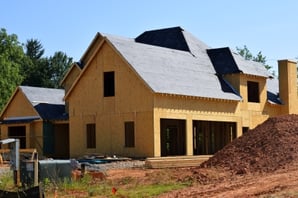The Differences Between Residential & Commercial Construction
Residential and commercial construction can be distinguished based on these four factors.
 Construction seems to be a topic that is easily accepted but hardly understood. Let’s talk about the key differences between two types of construction: residential & commercial.
Construction seems to be a topic that is easily accepted but hardly understood. Let’s talk about the key differences between two types of construction: residential & commercial.
Materials
The purpose for a residential building is very different from that of a commercial building, which leads to a need for varying materials. With commercial buildings, we usually see concrete and steel used because of their longevity. When investing in such costly and large commercial structures, using tougher materials will allow these buildings to maintain their investment.
Meanwhile, people who are looking to build a home are usually looking for the most affordable option. The most common material used in residential construction, at least in the U.S., is wood. Wood is also a reliable material but achieves results homeowners are most likely looking for.
Legal Requirements
Commercial buildings have stricter regulations than residential. Both require adhering to specific codes, project requirements, and obtaining permits from the municipality in which the structure is being constructed. However, commercial properties have different rules and regulations for building materials, building type, electrical systems, plumbing, construction process, design flexibility, and building size
Cost
The costs for residential and commercial construction are quite different. Which is the more or less expensive option, however, depends on the size of the project.
In commercial construction, the HVAC, plumbing, and electrical systems are generally larger and of much higher quality than in residential projects, but this is only one factor. Labor costs for construction workers can be immensely high as well, specifically for commercial projects since they tend to be bigger in many aspects and need a large number of higher-skilled workers.
Completion
Based on legalities and costs, commercial projects are usually higher risk and higher priority, meaning they are often completed more quickly. Commercial projects will usually have more workers on one project, which also speeds up the process.
The legalities in place for commercial projects can act as a very important “deadline,” and it can be immensely costly if construction passes it. According to a U.S. Census Bureau report, building a house can take around 7 months to complete compared to a smaller commercial project, which can take around 4 months.
The disparities between residential and commercial construction are evident across four key factors: materials, legal requirements, cost, and completion time. These distinctions underscore the unique challenges and considerations associated with each construction type.
Compass Group aims to bring our customers’ visions and goals into reality by providing high- quality development and construction services with integrity and an uncompromising commitment to excellence and customer satisfaction. For more information on the services we provide and to view our portfolio, visit https://www.compassgrp.com/.
Photo by Pixabay
